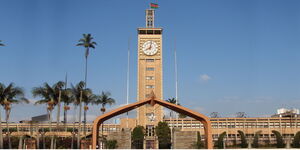Kenya is among three African countries targeted in Nigeria’s newly-launched AfCFTA air corridor, a strategic move to deepen trade ties while posing fresh competition to local exporters.
This is after the West African nation officially launched the corridor, which is aimed at boosting its exports to key African markets while cutting logistics costs for Nigerian exporters by between 50 per cent to 75 per cent.
For Kenya, this development could mean access to a wider range of imported products, particularly textiles, cosmetics, and agro-products, at more competitive prices, which are part o the products Nigeria aims to extend its market reach or. However, local manufacturers may face pressure from Nigerian firms benefiting from lower transport costs and newly gazetted AfCFTA tariff reductions.
The announcement was made on Sunday by the Minister of Industry, Trade and Investment, Dr. Jumoke Oduwole, who noted that the new corridor will operate via Uganda Airlines and would help link Nigerian goods more efficiently to African Continental Free Trade Area (AfCFTA) markets and unlock easier access for Nigerian businesses by significantly reducing transportation barriers and costs.
She noted that the new corridor, which will operate via Uganda Airlines, is part of a broader effort to link Nigerian goods more efficiently to African Continental Free Trade Area (AfCFTA) markets and unlock easier access for Nigerian businesses by significantly reducing transportation barriers and costs, as reported by Nairametrics.
''On Africa Day, we launch a bold new air corridor linking Nigerian goods to AfCFTA markets—via Uganda Airlines—cutting logistics costs by 50–75 per cent. This opens access to Uganda, Kenya & South Africa,'' Oduwole’s statement read in part.
Nigeria's Ministry of Industry, Trade, and Investment reiterated its commitment to supporting Nigerian businesses as they scale across Africa through this and other initiatives under the AfCFTA framework, which aims to create a single market for goods and services across Africa, promoting intra-African trade and economic integration.
Kenya and Nigeria maintain a trade relationship marked by a significant imbalance, with Kenya exporting much more to Nigeria than it imports. In 2022, Kenya’s exports to Nigeria were valued at approximately Ksh13.5 billion (USD105 million), while Nigeria’s exports to Kenya stood at about Ksh575 million (USD4.46 million).
Kenya’s key exports to Nigeria include vegetable fiber yarn valued at Ksh3.11 billion (USD24.1 million), coconut and other vegetable fibers at Ksh2.76 billion (USD21.4 million), and tea worth Ksh1.56 billion (USD12.1 million). These products reflect Kenya’s strength in the agricultural and textile sectors.
On the other hand, Nigeria’s exports to Kenya are limited and focused on industrial goods such as float glass Ksh125 million (USD972,000), brochures Ksh96 million (USD748,000), and raw aluminum Ksh88 million (USD680,000).
The trade imbalance indicates Kenya’s dominant presence in the Nigerian market, particularly in agro-based and textile products, while Nigeria’s reach into Kenya is comparatively smaller.
As both countries look to deepen trade ties through initiatives like the AfCFTA air corridor, there may be opportunities to balance and expand this trade relationship in the coming years, according to trade experts in Tanzania.












